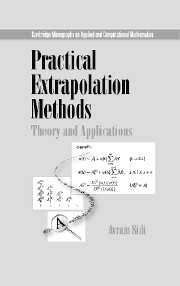25 - Further Applications of Extrapolation Methods and Sequence Transformations
from III - Further Applications
Published online by Cambridge University Press: 25 February 2010
Summary
In Parts I and II of this book, we studied in some detail the Richardson extrapolation and its generalizations and various important sequence transformations. We also mentioned several applications of them. Actually, we discussed in detail the Romberg integration of infinite-range integrals of regular integrands, numerical differentiation, and the computation of infinite-range integrals by the D-transformation. We discussed the application of the various generalizations of the D-transformation to the computation of oscillatory infinite-range integrals, including some important integral transforms. We also treated in detail the acceleration of convergence of infinite series, including power series and Fourier series and their generalizations, by the d-transformation and other methods, such as the Shanks transformation, the θ-algorithm, the Baker-Gammel approximants and their extensions, and so on. In connection with acceleration of convergence of power series, we also discussed in some detail the subject of prediction via the d-transformation and mentioned that the approach presented can be used with any sequence transformation. In this chapter, we add further applications of special interest.
We would like to note that extensive surveys and bibliographies covering the application of extrapolation methods to numerical integration can be found in Joyce [145], Davis and Rabinowitz [63], and Rabinowitz [234].
Information
- Type
- Chapter
- Information
- Practical Extrapolation MethodsTheory and Applications, pp. 415 - 456Publisher: Cambridge University PressPrint publication year: 2003
